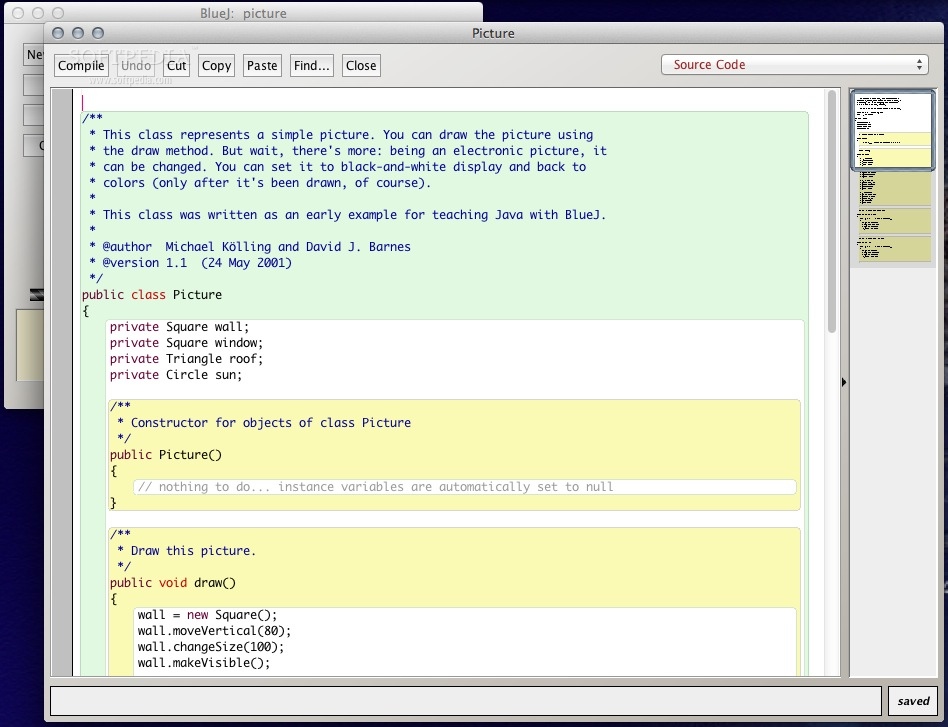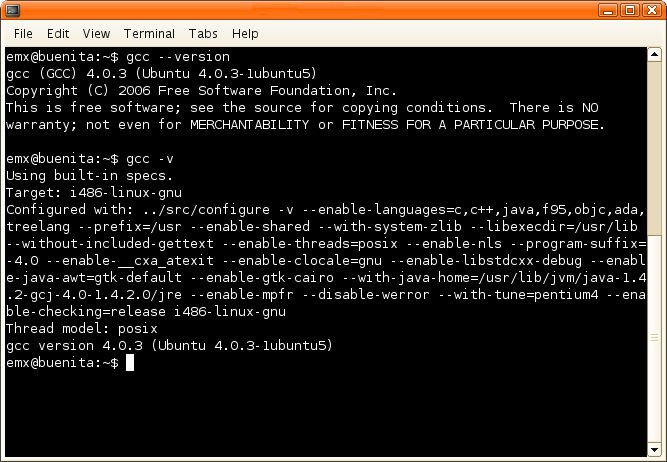- Install Gcc On Mac
- Gcc Compiler For Mac Os X download free. full
- Gcc Compiler For Mac Os X Download For Mac
Setting up gcc / OpenMP on OSX (Homebrew edition)
Let's launch a new instance of Terminal, and then we type the command again: gcc -version And this time, we get version information. One interesting tidbit is that we haven't installed gcc. Instead, we installed C-line but it's pretending to be gcc. But for our purposes, it doesn't matter. We have a compiler installed and available from the. More importantly, if you want to develop for OS X, sooner or later you'll have to write some Objective-C code, and that will have to be compiled by the Apple GCC. The only easy way to get a working installation of Apple's GCC is to install XCode, even if you later delete the IDE itself. – user57368 Jun 27 '09 at 22:37.
Gcc Compiler Download Mac Os Xforce
Watch the updated instructions: Now GCC 9 is out so you need to substitute g-9 with g-7 in the instructions. Sep 27, 2021 Question: Q: How to obtain a GCC on Mac OS X 10.11.6 I have to start coding in C next term (for school) and all of the tutorials on how to install a GCC compiler on Mac involve getting the Xcode app. Unfortunately, whenever I go to download it, it tells me 'Xcode can’t be installed on “Macintosh HD” because OS X version 10.12.6 or later. In OS X, GCC is part of Xcode’s command tools, so first, open the Mac App Store and install Xcode for free. Then, open Xcode, go to Xcode menu (on the menu bar) Preferences Downloads, and install Command Line Tools. You will get commands like gcc, make, purge. The table is sorted. Free download OSX GCC Installer OSX GCC Installer for Mac OS X. OSX GCC Installer is an application that either allows you to install the essential compilers from pre-built binary packages or helps you create your own installer. For users who can download from Apple a build of Xcode, but not the command line.
Note: This is part of a series of “how-to” blog posts to help new users and developers of BioFVM and PhysiCell. This guide is for OSX users. Windows users should use this guide instead. A Linux guide is expected soon.
These instructions should get you up and running with a minimal environment for compiling 64-bit C++ projects with OpenMP (e.g., BioFVM and PhysiCell) using gcc. These instructions were tested with OSX 10.11 (El Capitan) and 10.12 (Sierra), but they should work on any reasonably recent version of OSX.
In the end result, you’ll have a compiler and key makefile capabilities. The entire toolchain is free and open source.
Of course, you can use other compilers and more sophisticated integrated desktop environments, but these instructions will get you a good baseline system with support for 64-bit binaries and OpenMP parallelization.
Note 1:OSX / Xcode appears to have gcc out of the box (you can type “gcc” in a Terminal window), but this really just maps back onto Apple’s build of clang. Alas, this will not support OpenMP for parallelization.
Note 2: In this post, we showed how to set up gcc using the popular MacPorts package manager. Because MacPorts builds gcc (and all its dependencies!) from source, it takes a very, very long time. On my 2012 Macbook Air, this step took 16 hours. This tutorial uses Homebrew to dramatically speed up the process!
Note 3: This is an update over the previous version. It incorporates new information that Xcode command line tools can be installed without the full 4.41 GB download / installation of Xcode. Many thanks to Walter de Back and Tim at the Homebrew project for their help!
What you’ll need:
- XCode Command Line Tools: These command line tools are needed for Homebrew and related package managers. Installation instructions are now very simple and included below. As of January 18, 2016, this will install Version 2343.
- Homebrew: This is a package manager for OSX, which will let you easily download and install many linux utilities without building them from source. You’ll particularly need it for getting gcc. Installation is a simple command-line script, as detailed below. As of August 2, 2017, this will download Version 1.3.0.
- gcc (from Homebrew): This will be an up-to-date 64-bit version of gcc, with support for OpenMP. As of August 2, 2017, this will download Version 7.1.0.
Main steps:
Install Gcc On Mac
1) Install the XCode Command Line Tools
Open a terminal window (Open Launchpad, then “Other”, then “Terminal”), and run: Download lync client 2013 for mac.
A window should pop up asking you to either get Xcode or install. Choose the “install” option to avoid the huge 4+ GB Xcode download. It should only take a few minutes to complete.
2) Install Homebrew
Open a terminal window (Open Launchpad, then “Other”, then “Terminal”), and run: How to download spigot on mac.
Let the script run, and answer “y” whenever asked. This will not take very long.
Gcc Compiler For Mac Os X download free. full

3) Get, install, and prepare gcc
Open a terminal window (see above), and search for gcc, version 7.x or above
You should see a list of packages, including gcc7. (In 2015, this looked like “gcc5”. In 2017, this looks like “[email protected]”.)
Then, download and install gcc:
This will download whatever dependencies are needed, generally already pre-compiled. The whole process should only take five or ten minutes.
Lastly, you need to get the exact name of your compiler. In your terminal window, type g++, and then hit tab twice to see a list. On my system, I see this:
Look for the version of g++ without an “mp” (from MacPorts) in its name. In my case, it’s g++-7. Double-check that you have the right one by checking its version. It should look something like this:
Notice that Homebrew shows up in the information. The correct compiler is g++-7.
PhysiCell Version 1.2.2 and greater use a system variable to record your compiler version, so that you don’t need to modify the CC line in PhysiCell Makefiles. Set the PHYSICELL_CPP variable to record the compiler you just found above. For example, on the bash shell:
One last thing: If you don’t update your paths, make will may fail as it continues to combine Apple’s “gcc” toolchain with real gcc. (This seems to happen most often if you installed an older gcc like gcc5 with MacPorts earlier.) You may see errors like this:
To avoid this, run:
Gcc Compiler For Mac Os X Download For Mac
Note that you’ll need to open a new Terminal window for this fix to apply.
4) Test your setup
I wrote a sample C++ program that tests OpenMP parallelization (32 threads). If you can compile and run it, it means that everything (including make) is working! :-)
Make a new directory, and enter it
Open Terminal (see above). You should be in your user profile’s root directory. Make a new subdirectory called GCC_test, and enter it.
Grab a sample parallelized program:
Download a Makefile and C++ source file, and save them to the GCC_test directory. Here are the links:
- Makefile: [click here]
- C++ source: [click here]
Note: The Makefiles in PhysiCell (versions > 1.2.1) can use an environment variable to specify an OpenMP-capable g++ compiler. If you have not yet done so, you should go ahead and set that now, e.g., for the bash shell:
Compile and run the test:
Go back to your (still open) command prompt. Compile and run the program:
The output should look something like this:
Note 1: If the make command gives errors like “**** missing separator”, then you need to replace the white space (e.g., one or more spaces) at the start of the “$(COMPILE_COMMAND)” and “rm -f” lines with a single tab character.
Note 2: If the compiler gives an error like “fatal error: ‘omp.h’ not found”, you probably used Apple’s build of clang, which does not include OpenMP support. You’ll need to make sure that you set the environment variable PHYSICELL_CPP as above (for PhysiCell 1.2.2 or later), or specify your compiler on the CC line of your makefile (for PhysiCell 1.2.1 or earlier).
Now, let’s verify that the code is using OpenMP.
Open another Terminal window. While the code is running, run top. Take a look at the performance, particularly CPU usage. While your program is running, you should see CPU usage fairly close to ‘100% user’. (This is a good indication that your code is running the OpenMP parallelization as expected.)
What’s next?
Download a copy of PhysiCell and try out the included examples! Visit BioFVM at MathCancer.org.

- PhysiCell links:
- PhysiCell Method Paper at bioRxiv: https://doi.org/10.1101/088773
- PhysiCell on MathCancer: http://PhysiCell.MathCancer.org
- PhysiCell on SourceForge: http://PhysiCell.sf.net
- PhysiCell on github: http://github.com/MathCancer/PhysiCell
- PhysiCell tutorials: [click here]
- BioFVM links:
- BioFVM announcement on this blog: [click here]
- BioFVM on MathCancer.org: http://BioFVM.MathCancer.org
- BioFVM on SourceForge: http://BioFVM.sf.net
- BioFVM Method Paper in BioInformatics: http://dx.doi.org/10.1093/bioinformatics/btv730
- BioFVM tutorials: [click here]
Question or issue on macOS:
I have recently become frustrated with the new clang compiler included with Xcode 5. I was wondering what the best way to install GNU GCC on OS X would be.
Things to consider:
EDIT: Success! Using GCC 4.9.2 (with GMP 5.1.3, MPFR 3.1.2, MPC 1.0.2, ISL 0.12.2, and CLooG 0.18.1) I succesfully built GCC. Tips to take from here:
Hope this helps!
How to solve this problem?
Solution no. 1:
The way I do it is:

Download the source for GCC and numerous supporting packages. The instructions are in the
gcc-4.x.y/INSTALL/index.htmlfile in the GCC source code, or online at http://gcc.gnu.org/install/.- GNU Multiple Precision Library (GMP) version 4.3.2 (or later) from http://gmplib.org/.
- MPFR Library version 2.4.2 (or later) from http://www.mpfr.org/.
- MPC Library version 0.8.1 (or later) from http://www.multiprecision.org/.
- ISL Library version 0.11.1 from ftp://gcc.gnu.org/pub/gcc/infrastructure/.
- CLooG 0.18.0 from ftp://gcc.gnu.org/pub/gcc/infrastructure/.
Use a script to extract the source for GCC and the support libraries into a directory, create the object directory, and run the build.
This is the script I used for GCC 4.8.2:
When that finishes, run the install too. Then add $HOME/gcc/gcc-4.8.2/bin (the name you specify in --prefix plus /bin) to your PATH ahead of /usr/bin.
With a decent MacBook Pro with a 5400 rpm spinning disk, it takes an hour or two to compile everything (using the -j8 option to make), and requires multiple gigabytes of disk space while compiling. SSD is nice when doing this (definitely faster)!
GCC 4.9.0 was released on 2014-04-22. I've installed it using basically the same process, but with CLooG 0.18.1 and ISL 0.12.2 (required updates) and GMP 5.1.3 (and 6.0.0a), MPC 1.0.2 (or 1.0.1) and MPFR 3.1.2 on Mac OS X 10.9.2 Mavericks and an Ubuntu 12.04 derivative. Beware that the gmp-6.0.0a.tar.xz extracts into directory gmp-6.0.0 (not gmp-6.0.0a as you might expect).
Between 2014 and 2017-09-27, I've built GCC versions 4.9.0, 4.9.1, 5.1.0, 5.2.0, 5.3.0, 6.1.0, 6.2.0, 6.3.0, 7.1.0 with only minor variations in the build script shown below for GCC 7.2.0 on macOS Sierra (10.12). The versions of the auxilliary libraries changed reasonably often.
macOS Sierra and High Sierra

On 2017-08-14, I used a minor variant of the script above to build GCC 7.2.0 on macOS Sierra 10.12 (using XCode 8 as the bootstrap compiler). One change is that CLooG doesn't seem to be needed any more (I stopped adding it with GCC 6.2.0). This is my current script:
Make sure your version of tar supports all 4 different compressed file formats (.lz, .gz, .xz, .bz2), but since the standard Mac version of tar does that for me, it'll probably work for you too.
On 2017-09-27, I failed to build GCC 7.2.0 on macOS High Sierra 10.13 (using XCode 9 for the bootstrap compiler) using the same script as worked on Sierra 10.12. The immediate error was a missing header <stack>; I'll need to track down whether my XCode 9 installation is correct — or, more accurately, why it isn't correct since <stack> is a standard header in C++98 onwards. There's probably an easy fix; I just haven't spent the time chasing it yet. (Yes, I've run xcode-select --install multiple times; the fact that I had to run it multiple times because of network glitches may be part of the trouble.) (I got GCC 7.2.0 to compile successfully on 2017-12-02; I don't recall what gymnastics — if any — were required to get this to work.)
Time passes; version numbers increase. However, the basic recipe has worked for me with more recent versions of GCC. I have 7.3.0 (installed 2018-01-2), 8.1.0 (installed 2018-05-02), 8.2.0 (installed 2018-07-26), 8.3.0 (installed 2019-03-01) and now 9.1.0 (installed today, 2019-05-03). Each of these versions was built and installed on the current version of macOS at the time, using the current version of XCode for the bootstrap phase (so using macOS 10.14.4 Mojave and XCode 10.2.1 when building GCC 9.1.0)
Solution no. 2:
Homebrew now has the GCC package so you can install it with this command:
Solution no. 3:
Use a pre-compiled binary specifically for OS X 10.9.x Mavericks:
→ gcc-4.9
Compiled using source code from the GNU servers.
This contains current versions (4.7 is the stable release) of gfortran
(free, open source, GNU Fortran 95 compiler), gcc (GNU C) and g++ (GNU
C++) compilers that can perform auto-vectorization (i.e. modify code
to take advantage of AltiVec/SSE, automatically) and other
sophisticated optimizations like OpenMP. For more information, see
this webpage.
Download my binaries, and cd to the download folder. Then gunzip
gcc-4.9-bin.tar.gz (if your browser didn't do so already) and then
sudo tar -xvf gcc-4.9-bin.tar -C /. It installs everything in
/usr/local. You can invoke the Fortran 95 compiler by simply typing
gfortran. You will also need to have Apple's XCode Tools installed
from the Mac App Store. With XCode 4 or 5 you will need to download
the command-line tools as an additional step. You will find the option
to download the command-line tools in XCode's Preferences.
On 10.9 Mavericks, you can get the command-line tools by simply typing
xcode-select --install.
